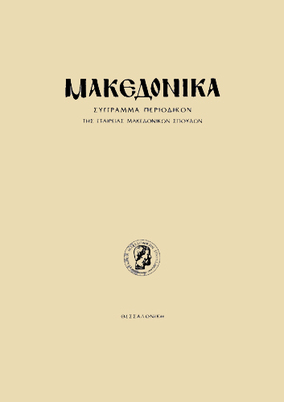Ατομικές χορηγήσεις της Ρωμαϊκής Πολιτείας (civitas romana) και η διάδοση της στη Ρωμαϊκή επαρχία Μακεδονία : ΙΙ. η περίπτωση της Βέροιας, έδρα του Κοινού των Μακεδόνων
Part of : Μακεδονικά ; Vol.27, 1989, pages 327-382
Issue:
Pages:
327-382
Parallel Title:
The individual grants of the Roman citizenship (civitas Romana) and its expansion in the Roman province of Macedonia : II. The case of Beroea, seat of the Macedonian koinon
Section Title:
Articles
Abstract:
In the frame of a wider study on the subject of the grant of the Roman citizenship and the expansion of the Roman civil law in the Roman provinces of the Balkan Peninsula, we have already published the results of our re search concerning the Roman province of Thrace (Dim. C. Samsaris, Re search on the history, topography and cults of the Roman provinces of Macedonia and Thrace, V. The policy of the Roman Emperors concerning the civil law in the Roman province of Thrace, Thessaloniki 1984, pp. 131 sqq.), the consequences and application of the constitutio Antoniniana in the Roman province of Macedonia («Offering to Prof. C. Vavouskos». vol. I. Thessaloniki 1989, pp. 339-353) and the individual grants of the Ro man citizenship to inhabitants of Thessaloniki, capital of the province of Macedonia («Makedonika» XXVI, 1988, pp. 308-353).From the point of view of method for identifying the peregrinos granted with the Roman citizenship, we classify them, as in the case of Thessaloniki, into three groups. In the first group we classify: 1) those bearing the gentilicia of Emperors (189 persons): 46 Adii, 8 M. Aurelii, 54 Iulii, 47 Claudii, 4 Ulpii, 2 Septimii and 28 Flavii\ 2) those bearing the gentilicia belonging to Roman magistrates of the Macedonia province; those are seven persons: Antestii, Cassii and Fabii. The second goup consists of 27 persons with a gentilicium common among the Roman magistrates of the Macedonia province and the Italian traders (negotiatores): Aemilii, Annii, Iunii, Clodii, Cornelii, Licinii, Marcii, Meminii, Vettii, Pcmponii, Pontii and Sextii. Finally, in the third group we enlist 103 persons bearing either a gentilicium of Roman magistrates of the neighbouring and the other orien tal provinces or a gentilicium common among those magistrates: 1) Avidii, Didii, Domita, Gelili, luventii, Caesennii, Caesernii, Cornimi, Lapii, Marii, Mestrii, Puplicii, Sergii, Sossii and Statii; 2) Attii, Aufidii, Munatii, Valerli, Ofellii, Pelronii, Popìllii, Rutilii, Sembronii, Sulpicii, Turpilii and Fabricii.The article ends with general conclusions and verifications. Thus we establish that the peregrini of Beroea who had become Roman citizens reach the number of 326: 196 persons (60,1%) of the first group, 27 persons (8,3%) of the seccond group and 103 persons (31,6%) of the third. We also find out that on a whole of 326 persons who received the Roman citizenship 189 persons (58%) are bearing the gentilicium of Emperors and 34 (10,4%) the getilicium of Roman magistrates of Macedonia. We come as well to the conclusion that the individual grants of the civiias Romana to the peregrinos of Beroea begins in the 1st c.B.C. and is growing, as in the case of Thessaloniki, during the period of Julio-Claudian dunasty. During the following dynasties the naturalisations’ rythm is varying. Thus we have the highest percentage in the period of Antonins with a peak during- the reign of Hadrian.With regard to the social dimensions of the naturalizations’ phenomenon, we notice that a high percentage over of the 50% affects members of the local aristocracy. This indicates that this particular social class of Beroea was, as elsewhere, the basis of the Roman power.Finally our research has proved that: 1) the expansion of the Roman citizenship and the Roman civil law in Beroea did not result the onomastic Romanization of its inhabitants; 2) Beroea, as seat of the Macedonian koinon, was the second city of Macedonia, after Thessaloniki, especially favoured by the Roman policy concerning the individual grants of the Roman citizenship
Subject:
Subject (LC):
Notes:
856:https://ejournals.epublishing.ekt.gr/index.php/makedonika/article/view/5667, DOI: https://doi.org/10.12681/makedonika.106
Electronic Resources:




